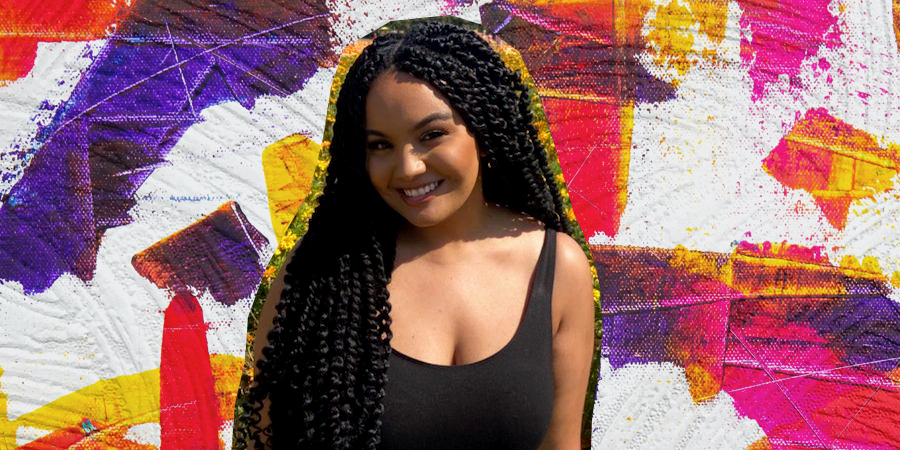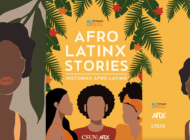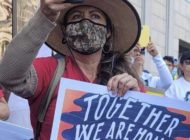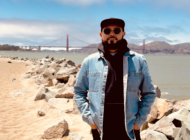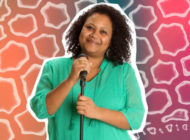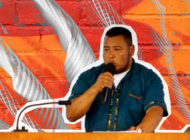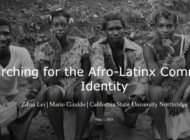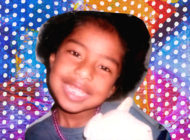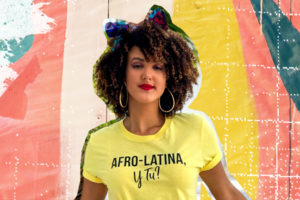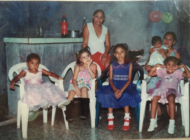In this episode, Bryan Arévalo talks to Arryana “Arry” Jackson, an Afro-Latinx student from California State University, Northridge (CSUN) who spoke about challenges stemmed from her appearance and feelings of exclusion as Jackson is both Black and Puerto Rican.
By BRYAN ARÉVALO
EL NUEVO SOL
Bryan Arévalo: Welcome to Radio Nepantla, a podcast by El Nuevo Sol, the multimedia site for the Spanish-language journalism program at California State University at Northridge. My name is Bryan Arevalo. The title of this series is Afro-Latinx. We want to tell here diverse stories of Afro-Latinx, Black-Latinx, and Afro-Latin American identity. According to the Pew Hispanic Center, one out of every four Latinos in the nation identify as Afro-Latinx. This is the same proportion of Afro-Latin Americans in that region. We decided to use the term Afro-Latinx—with X—to be inclusive of non-binary people. The umbrella term “Black-Latinx” refers to biracial people with one African-American and one Latinx parent. The umbrella term “Afro-Latin American” refers to people of African ancestry in Latin America.
In this episode, I interviewed Arryana “Arry” Jackson, an Afro-Latinx student from California State University, Northridge (CSUN). Through our discussion we spoke about issues and encounters she’s dealt with. Most of these challenges stemmed from her appearance and feelings of exclusivity brought upon by her mixed race as Jackson is both Black and Puerto Rican. Arry grew up in Newark, California, a small city thirty minutes from San Francisco. Growing up, Jackson recalls being one of the few biracial kids in her class and the exclusion she felt as a child.
Arryana Jackson: Growing up there were a few mixed kids—I think if it was off the top of my head, I can maybe say there was like two or three, if that. Yeah, not very many. But yeah, I was the first mixed with Black in my family. And then in my little town, definitely, I was one of few, definitely one of few in terms of the like biracial students and things like that.
Bryan Arévalo: This dismay would later affect the way she would see herself. The environment she was in affected her involvement with other children creating identity issues for Arry as she got older. Eventually, she would overcome these but it would never change the way she once felt.
Arryana Jackson: So, where I grew up it was mostly Hispanic, specifically Mexican, so there weren’t a lot of kids who looked like me per se. And what I mean by that is like, there was no like mixed kids and this is when being a mixed kid wasn’t as common as it is now. Like my little sis, like, there’s, biracial children everywhere, but for me it was a little less common. So, I definitely had some identity issues because most of my friends and the environment I was around was either—it was like Mexican or Hispanic. And so, I would say… yes, like for sure, I had some identity issues of figuring out like what I was. And I had some issues with accepting who I was because I wasn’t like the majority that I was surrounded by.
Bryan Arévalo: Everyone in Arry’s family has a multicultural background—a “blended family.” As Arry describes it, everyone in her family has a different ethnic background. But as blended as Arry and her family are, Arry felt different. She was the first Black mixed child in her family, which caused her feeling of exclusivity. Arry would also oftentimes compare her own parents to those of her peers’ parents.
Arryana Jackson: I think like for my family specifically, like, again, we’re so blended, like it’s crazy. But I would look at my parents and I would say like, “I don’t really look like either of them,” because my dad is darker skinned. I’m very not, I don’t want to say very white, but I am lighter. And then my mom is super-duper white. So, when you, when people would see me with my parents, if I was, if I wasn’t with both of my parents together, it would always be like, “how, how did this happen?”… Obviously now as an adult, I definitely don’t get those stares or questions that (are) often asked. And I’m glad it is 2021. So, I’m, I’m hoping I don’t get those questions anymore. But like, I would look at my parents and be like, man, like, “I don’t—I don’t look like them.” And then I’d see my friends and I’m like, “man, they look like their parents” because both of their parents were the same racial and ethnic background.
So… I would always compare and I would be like, “why don’t I look like my family?” Because also I could go along with the fact that I am the first Black kid in my family—I really am mostly close to my mom’s side. So, I would stick out even more and like my older two sisters, they’re not Black. So, I have older sisters. They’re just not, they’re not Black… I spent the first ten years of my life before my little sisters were born, just kind of standing out. So, if you see family pictures of us, especially if it’s just me and my mom and my sisters, I stick out like a sore thumb because I’m the only, like, I’m the only Brown one in the photo. So yeah… there was a lot of comparing, in terms of like, well, (what) my friend’s parents looked like versus what my parents looked like.
And I wouldn’t necessarily look at it in a negative light. I think there were times where I did just because I was tired of getting asked questions of like, “oh, is this actually, your dad? Is this actually your mom.?” But, yeah, well, a lot of comparing, a lot of—and even like you asking me that question, like, as I’m thinking about it, like, yeah—like, I did compare a lot. But there’s—what my parents look like versus what other people’s parents look like. And, there were times where it was like… “what if—I wish just like one, like one racial ethnic background, like what if I was just Puerto Rican? And what if I was just Black?” Like, what would it be like? In a way kind of easier because I wouldn’t get all these questions and I wouldn’t have these identity issues. And then, when I—when me and my whole family speak specifically to my mom’s side, when we take pictures, I don’t stick out.
Bryan Arévalo: In Newark, Arry also never felt Black or Latin enough for one group of friends. She would deal with issues of race, adding to her sense of belonging.
Arryana Jackson: And I still feel like I face that as an adult. Like, as a kid, I didn’t know what group to hang out with.
Like… I don’t know if I’m Black enough to hang out with the Black kids at my school, but I don’t know if I’m—obviously there’s like, there’s like, no, Puerto Rican’s in my town. Like my family’s probably like the only one within like a 30-mile radius. But I was like—for my Hispanic side, like, I don’t know if I fit in enough with them, because I don’t speak Spanish.
I’m not super immersed in the culture. And I’m also not Mexican, which was predominantly what my school was. …If you were Hispanic—most (of the) majority of my school—you were Mexican. And so, for me, it’s like, I don’t really fit in with them because yeah, I’m Hispanic, but I’m also Black. I also don’t speak Spanish and I’m also not Mexican.
And so, it would definitely be like an in-between kind of thing—and with my friend group specifically. …My best friend, she’s Filipino. And then my friend group in high school, they were kind of a mixture of everything—mostly just Mexican and Filipino would be probably the majority of my friend group.
And so, I stood out again and it kind of was like, no matter which group I choose, whether I choose a more mixed friend group where we’re just kind of a mixing pot full of everything—or if I can lean more towards my Black side or lean more towards my Hispanic side—I didn’t. There was a part of me that didn’t fit in (any) single group.
So yeah, it was, again, it was a whole like identity thing. Because I was mostly around friends and a community that was mostly like Mexican. I would like to try to convince myself that like, I have—but yeah, I am Mexican. Like I would like to try to make myself like, be that because I didn’t know what else to be, because I didn’t fit in with anything.
So yeah, there’s definitely a lot of identity issues in terms of who I felt like I could hang out with and who I felt like I couldn’t. And then as an adult, it’s kind of the same because it reflects—I don’t think it’s as intense as an adult, but when you have these like kind of biases or thoughts in your head of like who you—where you belong—it carries on into your adult world, into your adult life.
So even as an adult, I’m still trying to find like, where do I kind of like fit in. But in reality, it’s like, I can fit in wherever. I can go to any—I can go to any of these three categories of groups, whether people are mixture of everything or Hispanic, I can go to any of these groups and still get along.
Because at the end of the day, I’m a part—there’s a part of me in every single one. But, I do think sometimes like, there’s this negative notion towards like biracial kids and like, kind of like, “oh… they don’t know how to like pick one,” or sometimes we’re not, we’re looked at as, not enough of one race or ethnicity.
So yeah, it’s been, it’s been, it’s been a rollercoaster the past 21 years and I’m sure it’s going to be a roller coaster for the next 21 years.
I would say like, it’s more like, it’s definitely like an emotional roller coaster cause it’s… essentially just coming down to like, where do you belong? And then like if you belong to some kind of thing.
Bryan Arévalo: With her walls up and having no sense of belonging, Arry would often reject or exclude herself to save the trouble of fitting in with one group of people.
Arryana Jackson: There were some times where, like, I just wouldn’t even try to fit in with one of my racial, ethnic backgrounds more than the other, because I was like, “I’m going to get turned away.” Or “they’re not going to accept me,” or they’re going to be like, “you’re not enough. You’re not Black enough. You’re not good enough. You’re not this enough.” So, I kind of just chose to kind of be like, well, I’m just not going to pick a side. I’m just going to kind of be in the middle and with being in the middle. And of course, with my, where I live and things like that, most of my friends ended up being either Filipino or Mexican-American.
Bryan Arévalo: Due to Arry’s lighter complexion, people saw Arry as Black. People would never typically know that Arry was Puerto Rican if she never explicitly explained that part of her to them. People would often praise her for being different. However, in her family it was the opposite. Her distant family members would often make comments to Arry for being Puerto Rican and having Black roots. Since Arry was the first Black child in her family, her distant family members would often make comments based on her skin or used natural evil terms of endearment to make her feel different as a child.
Arryana Jackson: Like sometimes from maybe my, like from my Hispanic side, my mom’s side of the family, they would like, again, first, first mixed one. So, it’s like, I’m the first thing they see when they look at me is that, “oh, that kid is—that child’s Black.”
So, on my mom’s side, obviously like my mom’s siblings, my grandpa, my grandma, and all them that they were like, whatever, I get my family’s very blended. So that being biracial was never really an issue on my mom’s side of the family. But when you started getting to like the cousins and, more like distant family, that’s when they would, like, I wouldn’t necessarily say that it was like racist things, but just things that like, you probably shouldn’t say to someone, so they would call me like, they would call me like, Oh, their Black princess.
And on my mom’s side, it’s like a distant, like distant family. They would call me, their Black princesses and things like that. They’re like, Oh, she’s so beautiful, like, she’s such a beautiful Black girl. And obviously this was one side in Spanish, but it was kind of like, why can’t I just be like, beautiful, why can’t I just be a princess?
Why do I have, what is Black up to be in front of it? And sometimes I felt like, cause on my mom’s side my Puerto Rican side does have some like African in it. Like there was some more African influence. And so like, sometimes I was like, that’s not really an excuse to refer to me as Black or anything else, but there’s more, there’s more to me than that.’
Bryan Arévalo: Arry would learn to embrace her culture and her skin color while fighting the microaggressions that people would throw at her. Now as a Black woman, Arry has encountered racism in her day-to-day life. She shares an anecdote of a time that she was accused of stealing a candy at a Ralphs, just days before our interview.
Arryana Jackson: It’s also, because I am looked at more as being Black, most of the racism, microaggressions, or oppression I have faced or will face will be mostly Fords. Meeting and, just an instant instance. The other day I went to CVS, got some candy I had in my purse, candy was sticking out of my purse.
And I had the receipt and I went to Ralph’s, which is right next door because Ralphs and CVS are right next to each other. Ralph’s didn’t have the candy. I wanted only CVS had it. So, I was like, okay, we’ll go to CVS first, put the candy in my bad then I’ll go to Ralph’s. And the candy was sticking out of my bag a little bit.
And when I was at Ralph’s, this was like a couple days ago when I was out one of the security guards, he came up to me and kept the candy sitting on my purse, but I had a cart. I had a hand basket. So, it’s like, if I bought it at Ralph’s, why do I put it in my purse? I put it in my hand basket right.
And a security guard came up to me and he was like, “Oh, excuse me. Ma’am do you need a cart?” And I was like, I conflict. And he pretty much was saying like, Oh, I see the candy in your purse. And he thought it was stealing. He thought it was stealing from the store. And when I wasn’t, I don’t, I’ve never stolen a day in my life.
And like so, I. He asked me if he could see the receipt. And so, it’s cases like that where I’m like, I don’t, I don’t know if I was, if I wasn’t Black, when I really go through these things.
Bryan Arévalo: She also shared an instance in which a woman made a racist remark to Arry at the gym.
Arryana Jackson: I’ve gone through instances where I was at a gym. And there was this you in gym locker rooms, as you might know, you’re not really supposed to use your phone, but I was just responding to a quick text.
There was nobody else in the locker room. And then this woman, she was actually in the store, she came out the bathroom, she was fully closed. She was not undressed or anything. I was just sending a quick text. And essentially it came down to a point where she was her and I were arguing. Cause she was like, you need to put your phone away.
And almost like, it is a way I’m putting it away right now. Just responding to a text. I wasn’t, I didn’t have my camera out. And she was like, I saw you with your camera. I’m like, no, I didn’t. And then she, at the end of the story, I pretty much all she said was people, your people can’t read. And I was like, yeah.
So, it’s again, most, most of the time. When I do go through any type of racism, oppression, microaggressions, it’s solely off of my Black side, not my Hispanic because people don’t see it. They only see my Blackness, which I’ve never been uncomfortable with, but there are situations where it does become uncomfortable because it’s like I haven’t honed it down to make someone else feel comfort.
Bryan Arévalo: As strong as Arry may be, it is still unfortunate how strong she must remain because of the racial injustices that occur in the entire world today. She would share a few tips that her father has given her in order to prepare for an encounter with a cop. Those powerful words resonated throughout the entire interview. Although Arry has gone through many racial issues now, she tries to focus on her well-being and tries to smile even in her darkest circumstances.
Arryana Jackson: I Smile. Because like, it’s more so like you get prepared for these things, you like, like. You know, ever since I was a kid, my dad would sit down and have comps and be like, this is like how to handle it.
You know, kind of like how to deal with the worries one-on-one, like for the course that every, probably not every, but probably most Black children have to have with their parents or with a guardian or somebody who, who understands this goes. So, like for me, like when I drive my proof of insurance is in my little sunglasses compartment above my head.
So, I don’t have to reach for my glove compartment. My license is always right by my gearshift. So, then I don’t have to reach into my purse to grab my license out of my wallet. And my, my license is always out. You know, I have my phone on a little like damn thing that connects to your air conditioning vents.
Yeah. I have one of those. I have my phone there, so then if I ever get pulled over, I can press record right away. So, I don’t have to reach for anything and like hurry up, find my phone, things like that. It’s just got a wow. Unfortunately, the way of the world.
Bryan Arévalo: On a positive note, Arry enjoys celebrating her spanish culture, especially when it comes to eating. She claims that she is closer to her mothers side of the family and grew up eating and making cultural dishes. A few foods would include Farina, Arroz con Dulles and a shaved ice called Piraguas.
Arryana Jackson: So, we would eat a lot of light. Oh, gosh, I don’t it’s okay. So, it’s called Farina, which essentially is like literally cream of wheat. Like it’s nothing crazy. Like it’s just cream of wheat. I think it’s the most amazing thing I’ve ever had in my life. Like when I would go as a kid, sometimes we would go to Puerto Rico.
They would put raisins in it and like Brown sugar. And it was like the best breakfast I’ve ever had in my life. So, every time my grandpa would go back to Puerto Rico because he would go pretty often obviously pre COVID and things like that. So, I would always tell him, like, can you give me a box of Farina, which I literally could get in the States?
Like, I could literally get a box of cream of wheat, but I’m like, no, it has to say Farina up. It doesn’t say that then. Like I’m not eating it. Let’s see. What’s some other things? It’s called Arroz con Dulles. So essentially, it’s just like Puerto Rican rice very similar to like Mexican rice or Spanish rice. It’s just not like you, we put chickpeas in it and Sometimes my will is like my grandma, my grandpa likes the bottom of it.
Like the bottom of the possibly he’s like this big, like metal pot. Right. And if you cook it for too long, then obviously they will burn on the bottom once the water evaporates. And so, my grandpa likes that part. He likes when the bottom is burned and he’ll eat it. And so, like I, I kind of like it too low key.
I don’t like it when it’s super burned, but just like a little bit, it’s like so good. And then especially if you mix it with like the soft rice at the top, how was a really good dish kind of thing, trying to think what else? Oh, it’s more like a dessert when we go on the Island, but it’s called Piragua and it’s literally a snow cone.
Like all these fancy words. You see like the Piragua man with his little bell and like walking down the beach. And so, I would always, like, there’re so many pictures of me as a kid, like next to the Thiago guy, like just smiling like snow in my head. Yeah. I looked at him like a God. Like I knew he was torn down on those Thank you so much for your service or like changed my life. I think pretty much like most of them, like I can come up with that I would eat as a kid. I know that they like, there’s a lot of, like, I don’t know the names of them specifically, but there’s probably like guava pastries that they would sell on the Island that I would get a lot or like guava I literally was just like, just guava that’s like, like jelly kind of, and my grandpa would eat that.
I’m not the biggest fan of it, but he would eat it. But yeah, it definitely ate a lot of those.
Bryan Arévalo: Seeing that she is a fan of her Spanish culture, it only brings about the question if she personally would feel more connected to her mom’s family since she is closer to them, and if her hair plays another factor in exclusivity since it is naturally curlier.
Arryana Jackson: Yeah. That’s a really good question. I think hair is such a big, like identity thing, especially within a Black woman. You know, it’s literally a part of us, it’s something that society uses in a way to define us. Whether that be, you can take that as good or bad, but, for me specifically, like I changed my hair.
Like, I changed clothes. I, I’m, my hairstyle is always, is always different. So, I do, I changed my hair a lot. But with that being said, depending on how my hair is kind of defines how I get treated sometimes by either community.
My hair is defined as “4c”, which is one of the most courses, hair textures that someone could have with her to an extent. Obviously there’s course more coarse hair than mine, but to make it simpler.
Yeah. I have very coarse hair. So, because of that, a lot of times I’m like my hair is blacker. Like my hair is blacker. Yeah. It’s not mixed. It’s not, it’s not mixed at all. My hair’s blacker. And so, would that being said, because I didn’t like my hair, I went through a whole, like. To simplify identity, crisis. So, when it’s not in braids, it’s not in Quist. It’s not straightened, curled, whatever it may be. When it shoots out, I feel so vulnerable. Like. We looked at myself and I’m like, hi, like, this is like me, like, like this there’s no extensions. There’s no, like, especially if I don’t have makeup on too, like there’s no lashes on, my, this just my, you could see me at the scars on my face, you can see the unevenness of my hair, the thickness, the quaint, the oiliness, and you just feel very vulnerable.
And I’m learning to try to allow myself to have my hair out like that. But I do get nervous. I do. I get very nervous when I just have it out because I don’t want to be judged or looked at a certain way.
Bryan Arévalo: For now, Arry is continuing to radiate positivity and learn to accept herself for who she is, one day at a time. She also finds that she is learning to embrace both cultures, even though it is difficult since there is not such a thing as being enough for one culture.
Arryana Jackson: I think like there’s times where I tell myself, like I can literally like have my hair, Afro it out fist in the air saying yes, being a one activist, being a part of all these clubs and organizations that are more racial and ethically based. And I still sometimes feel like it won’t be enough, and the same thing goes for my Hispanic side, I can, wave my flag around, have a little tiny flag hanging from my car.
You know, try to speak Spanish when I can, listen to Spanish music, things like that. And I still feel like it will never be enough. So, I think now again, as I am getting older and more comfortable with it, I kind of like it, I don’t really have enough for either side. You know, I am enough regardless.
And, it’s more so just finding those, those people or those groups of people that don’t care, what you look like, what you are, the food you eat, the languages you speak. You know, it’s because if I. I’ve realized that no matter how much I try to fit in or be enough, I’ll always, it will never be, it will never be enough.
So yeah, I kind of, I’m just like, whatever, I’m just going to, I embrace, I raised both sides as much as I can.
Bryan Arévalo: Ultimately, she encourages herself and others to continue to do research on different cultures. Not just as someone who has multiple cultures in her family, but as an educated individual.
Arryana Jackson: You have to listen to research and all these things. So, for me, I am, I am no expert on either side of my identities and, I try to learn the best I can and I’m trying to keep up, but there’s always going to be something I need to learn or something that I may be did in the past that I shouldn’t be doing now, things like that.
And so, for me, it’s like, I’m learning, but I’m also using my experiences at the same time with what I write and what I decide to market and things like that. I do, I do take my identities and how I implement them into my almost career field now. Very seriously, I think. And I think it should be because, it’s, why would you, why would you read a story about a community written by somebody who knows nothing about it?
So, it’s, I’m very, like, I’m very keen on getting to know more about my community. So then when I write about my communities, I know what I’m talking about and I don’t sound arrogant or whatnot because at the end of the day, going back to the very beginning of this, interview or conversation we’re having, I didn’t grow up around very many people who were like me, both identities, like both my Black side and my Puerto Rican side.
I didn’t have a lot of people around me like that. So, as I’ve gotten older, I’ve immersed myself into both of these communities and have tried to learn as much as I can absorb as much as I can, because usually what a kid would absorb when they’re, three, four years old and into their, grade school I’m absorbing when I’m 16, 17, 18 years old, because I didn’t have, I didn’t have anything else.
So, it’s definitely. It can be a challenge sometimes when it comes to writing and things like that. You know, because I think sometimes what happens is, if I, as a Black woman and write a story about the Black community, people automatically think, Oh, she’s an expert. She knows exactly what she’s talking about.
Bryan Arévalo: For now, Arry will continue to educate herself and work towards her degree in Journalism with an emphasis on PR. She credits her knowledge on the higher education system and maturing as a young woman.
Arryana Jackson: It’s a lot easier. And so, instead of me, like putting in, putting in straight hair extensions, so I fit in or toned it down. So, I’m not as Black, like, whatever that even means, things like that. Like, I don’t even, I don’t even do it anymore or, making myself more likely to put it into easier terms.
Like when I’m like with my Hispanic side, I’m like, oh my gosh, I have to tone it up. So, then I see, I see I’m authentic with my Black side. I’m like, oh my God, I have to turn it up. So, I’m like Blacker, like, what does that even mean? And so like, I don’t even do that anymore. I’m like, this is me. This is how I speak.
This is how I carry myself. You know, if one side or specific people from one side don’t want to accept me because of the way I grew up or how I, how I display myself, then, that’s okay.
Bryan Arévalo: She continues to identify with her Black side based on her skin but respects both sides equally while sharing her taste in music in reggaeton and her fathers classic music. She stated that if she decides to have kids and start a family in the future, she would like to teach her kids about the cultures and traditions of her family, but would not let those things define them.
Arryana Jackson: Cause my family so mixed. Like I can, if I have kids with no matter what ethnicity the man I have kids with I definitely like think that I’m going to teach them these things, but at the same time, I’ll just let them know like make it what you want. Like you don’t have to follow. There are no rules to like being Puerto Rican 101—being Black 101 because, let’s just say I have kids with a white man. For example, my kids will be very small percentage of both of these identities, which I do want them to know about. But I also want to emphasize that there’s more to them.
Bryan Arévalo: Arry Jackson, a third year senior at California State University, Northridge will continue to educate herself and her peers on the Afro-Latinx community. She plans to graduate from CSUN this fall 2021 with a journalism degree in hopes to make the world a better place through PR work.
Bryan Arévalo: Thanks for listening to Radio Nepantla—La Voz que Traspasa Fronteras. We invite you to listen to the rest of the series Afrolatinx … We will tell you stories of Afro-Latinx identity.
Listen to our podcast on your favorite platform. You can also check our SoundCloud channel—ElNuevoSol—or our website: ElNuevoSol dot net.
This was a production of El Nuevo Sol—the multimedia project of the Spanish-Language Journalism program at Cal State University, Northridge.
This episode was produced and edited by Bryan Arevalo
Voice (or voices): Bryan Arevalo and interviewee, Arryana Jackson.
Music by Kolimbesa Mi].
See you next time.
Tags: #AFLX African American Afro-Latinx Arryana Jackson Bryan Arévalo podcast Puerto Rico Radio Nepantla






